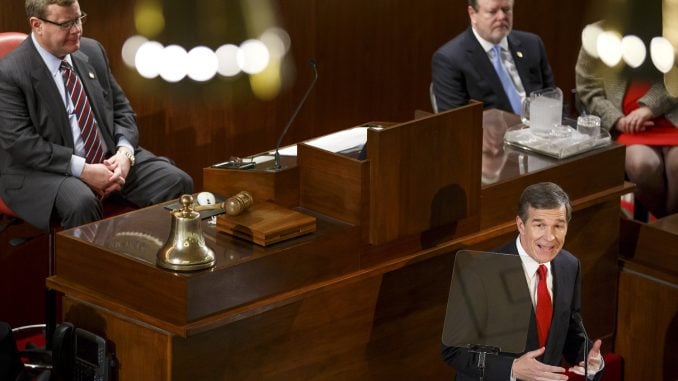
RALEIGH Gov. Roy Cooper (D) called a special session Wednesday to redraw legislative maps that have been deemed illegal, while he also demanded that legislators meet a 14-day deadline. House and Senate leadership, as well as Lt. Gov. Dan Forest (R) rejected the call Thursday citing its questionable constitutionality and the need to wait for direction from the judiciary.”We’re going to act in compliance with the court’s order,but we haven’t gotten the guidance from the court,” said Speaker Tim Moore (R-Kings Mountain) on the House floor Thursday after adjourning the session. “The only way that we can act is once we have guidance from the courts. The only thing we know is the courts are going to make us redraw the districts in 2018…but they haven’t told us how we need to do it differently.”Senate leader Phil Berger (R-Rockingham) also rejected the governor’s call to special session citing the constitution and the need to wait on the judiciary to tackle redistricting.”The courts have yet to give the legislature direction on this matter, and we will be prepared to undertake a thorough redistricting process with ample notice and opportunities for public input when they do,” said Berger is a press release. “In the meantime, we refuse to be manipulated by the governor into having an unconstitutional special session and will keep our focus on passing a balanced state budget that raises teacher pay, provides relief to the communities affected by Hurricane Matthew and puts money back into the pockets of middle-class families.”In a press release sent while legislators debated an energy reform bill on Wednesday, Cooper cited the U.S. Supreme Court decision on Monday and a North Carolina General Statue as justification for calling the extra session. “Republican legislators appear to be dragging their feet to fix their racially gerrymandered maps and would ultimately require a special session after they’ve already adjourned from regular session to enact new maps,” Cooper’s press release read. “Running a special session during the regular session also saves taxpayer money because legislators are already in Raleigh.”The governor always holds the right to call a special session for extraordinary circumstances, though the legality of this particular session appears to be blurry. Lt. Gov. Dan Forest (R) published a YouTube video Thursday admonishing Cooper for calling the special session and pointing to constitutional language that he only do so “on extraordinary occasions, by and with the advice of the Council of State.” The governor and his supporters were quick to justify that state law says legislators have “14 days to fix their map before a court can step in to draw the maps itself”. However, the statute appears to state that the two weeks is a minimum requirement, not a strict deadline.
As laid out in NCGS § 120-2.4, “in no event may a court impose its own substitute plan unless the court first gives the General Assembly a period of time to remedy any defects identified by the court in its findings of fact and conclusions of law. That period of time shall not be less than two weeks. In the event the General Assembly does not act to remedy any identified defects to its plan within that period of time, the court may impose an interim districting plan.”Conflicting interpretations of the statue were at the center of the debate between the Democrat governor and the Republican-led legislature late Wednesday, as senior lawmakers stepped out of session to meet behind closed doors to review the order after the news broke. Specifically at issue was who has the authority to impose the deadline and when the starting point for the window of time may begin.By Thursday, lawmakers had settled on legal grounds from which to resist Cooper’s call for a special session.If held, the special session would run concurrent to the ongoing regular long session, and would likely push budget negotiations, which are currently underway, up against the looming June 30 fiscal year deadline. Insiders say that Cooper’s tactic is a savvy political move, both pinning Republicans in a tight legal spot while also offering ample fundraising potential. Moments after Cooper made his announcement, the N.C. Senate Democrat Caucus sent out an email praising the governor’s special session and asking supporters to donate $10, $15, or $30 to help leaders “fight back” and “get NC back on track.”On Monday, the U.S. top court reaffirmed a lower court’s ruling that N.C. Republicans mapped state legislative districts in 2011 in a way that diluted the clout of black voters, but threw out a separate decision telling the state to urgently redraw them. The justices outlined a number of legal issues that should have been addressed prior to mandating a special election. “We cannot have confidence that the [district] court adequately grappled with” the ramifications of a special election, read their written opinion. The high court did not address issues with or timing pertaining to the actual drawing of the maps, only concerns with a subsequent special election held prior to November 2018. If Cooper’s move succeeds and the maps are in place by this summer, there might still be an appetite for an early election. Democrats kept that door open in their statements early this week. “Whether the election is November 2018 or earlier, redrawing the districts is good for our democracy by leveling the playing field for free and fair elections,” Cooper said on Monday.This would not be the first time a special redistricting session occurred during a regular session. In 2002, a special session was called to order two weeks before the beginning of the regular session and lasted for the duration of the regular session, but did not impose a deadline.




